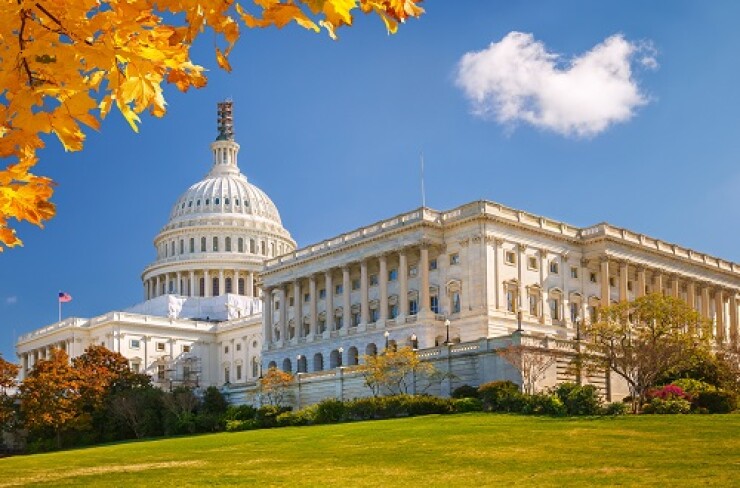Want unlimited access to top ideas and insights?
Credit unions got what they wanted in the 2016 election with a GOP-controlled Congress focused on regulatory reform, but analysts say the shift to a Democratic-controlled house starting in 2019 means the industry will have to reprioritize its goals as gridlock looms.
A divided government – combined with a presidential election cycle starting even earlier than usual – is likely to lead to even more of a political standstill, but one observer suggested there’s a silver lining to that.

Gridlock, said Dan Berger, president and CEO of the National Association of Federally-Insured Credit Unions “isn’t necessarily good for the country overall … but when you look at the credit union industry as a whole, when there’s no spikes in legislation that affects credit unions, you have a consistent environment to operate your business in. That’s a win, oftentimes. You can do some long-term planning without any legislative surprises.”
And Reps. Maxine Waters and Richard Neal, respectively the predicted incoming chairs of the House Financial Services and Ways and Means committees, have already indicated that data breach legislation, regulatory reform, charter enhancements and preserving the tax status will be priories, noted Ryan Donovan, chief advocacy officer at the Credit Union National Association.

Berger also noted that Waters has already “made it very clear” that she’s no fan of big Wall Street banks and predatory lenders, which could indicate a willingness to look at issues near to credit unions’ hearts, such as financial education and inclusion and further field of membership changes. He added that trade groups will also continue pursuing to further delay the National Credit Union Administration’s risk-based capital rule. The NCUA board already pushed implementation back to 2020, but a bill awaiting passage in the Senate would lengthen that to 2021.
“One issue we ought to not forget about is data security,” said John McKechnie, a credit union consultant and former NCUA and CUNA staffer. “Both parties have avoided doing anything meaningful for data breaches. Whether there’s Republicans or Democrats in control, the need is there for credit unions to keep pressing the case for this. If they don’t and we let retailers continue bottling up reforms for data security, it’ll be a real shame for credit unions and consumers.”
The credit union tax exemption made it through this year’s tax reform process unscathed. McKechnie suggested that while Democrats “want to revisit tax reform and roll back as much of it as they can, I don’t think they specifically identify the credit union tax exemption as a problem. But if Democrats put the tax code back on the table, we’ll have to be very vigilant about what types of changes will be put forward in that legislation.”
NAFCU’s Berger suggested that changes to CUs’ tax status are not only off the table, but also that “there’s [no] appetite on either side of the table for that.”

Geoff Bacino, a credit union consultant and former NCUA board member, said increased gridlock could even help further protect the tax status. But, he added, “if you’re interested in progress and things being done, it doesn’t bode well. Frankly, it means things just get pushed down the road.”
One area likely to become increasingly important amid increased Congressional dysfunction, observers said, is the regulatory sphere. If credit unions can’t get legislation passed, they may turn their efforts toward seeing what they can accomplish directly through NCUA.
“Regulators become the arbiter of judgment; they become the decision-maker,” said Bacino, adding that an already short-handed NCUA board could see further changes when Chairman Mark McWatters’ term expires next year. When Republicans had control of Congress, they also controlled the nomination process, he added. But with a divided legislature, “both parties will have to start making more deals than they do right now.”
CUNA’s Donovan, however, downplayed the parties’ impact on the NCUA board.
“The partisan make-up of the Senate matters a little less in large part [because] there’s an expectation of the two vacancies being filled by a Democrat and a Republican,” he explained. “The president has nominated a Republican [former board member Rodney Hood] and we’re waiting for a Democratic nominee. If there are two nominations moving, it really takes any of the partisan sting out of the nomination.”
NAFCU’s Berger predicted Hood’s nomination could move forward during the legislature’s upcoming lame duck session since a number of positions at various regulators still need to be filled along with some judicial appointments.
With a handful of races still to be called, credit union trade groups are touting that the movement has strong support on both sides of the aisle, but McKechnie reminded that even though voters elected a credit union-friendly Congress, that doesn’t mean it’s entirely smooth sailing ahead.
“It’s misleading to say that credit unions are bipartisan,” he said. “Democrats tend to like credit unions more because credit unions are pro-consumer and are a check on the banking industry. But they're not as enthusiastic when credit unions come to Democrats to discuss regulatory relief, whereas Republicans are enthusiastic for rolling back regulatory burdens. From a 30,000-foot view, there looks like there’s bipartisanship, but it’s different flavors of support.”





